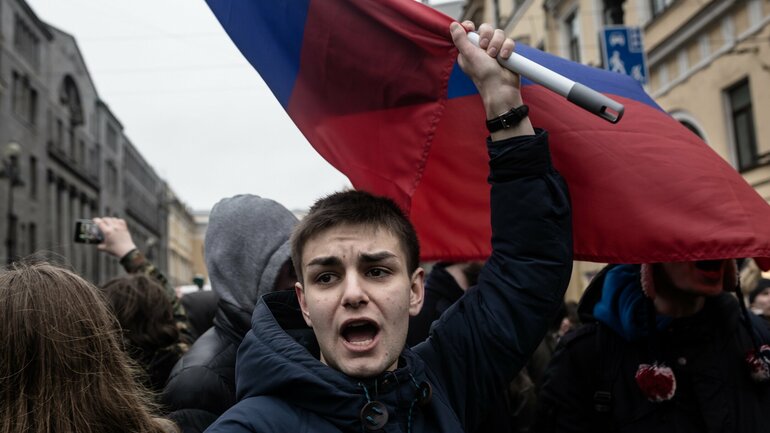Enraged young Russians?

Protests across Russia in late March 2017 led to enthusiastic comments in several Western media outlets about the democratic revival of the country’s youth. Reacting to the large-scale corruption unveiled by Alexei Navalny and his team, some 60,000 people took to the streets in more than 80 cities. This largest wave of protest since 2012 included hitherto unlikely places of opposition activism like Vladikavkaz or Vladivostok. Many who took to the streets have known no other president than Vladimir Putin (and Dmitry Medvedev), a new Generation P with faint memories of the chaos of the 1990s so vividly described in Victor Pelevin’s iconic novel.
For some Russian youth, these events will symbolise their political baptism. Navalny and the left-wing political activist Sergei Udaltsov have been focusing on young people for a long time. Their anti-Kremlin political outlook has contributed to socialising those who protested, questioning the political and educational systems shaped under Putin. For Russia’s public, the youth has once again surfaced as a distinct political agent, questioning assumptions about an apolitical and economically opportunistic generation.
These recent protests are part of an expanding social activism across Russia. Although they remain on a much smaller order of magnitude than those of 2005 or 2011–12, they indicate Navalny’s mobilising power. He and his team capture much of Russia’s democratic opposition—a part of the population which the polling institution Levada estimates to be around 2 to maybe 3 million people overall. The excessively negative coverage in state-controlled media limits Navalny’s reach among the population. However, young people rely slightly less on state-controlled media and get their information from social media as well. This shift in how information is accessed challenges the state’s monopoly on what qualifies as truth among young people.
How does this picture of a critical or even enraged youth fit into broader patterns of what is known about Russian young people? A survey of 17- to 34-year-olds undertaken in early March by the Public Opinion Foundation (FOM) paints a contradictory picture of Russian youth. According to this poll, around 28 per cent favour nationalisation of key industries and adhere to some kind of socialist political views. Young Russians, it seems, reject the ego capitalism (капитализм для своих) of the 1990s, and only some 20 per cent favour a liberal economic model.
When it comes to political mobilisation, Russian youth on average resembles the older generation. Around 85 per cent of 17- to 34-year-olds indicate that they have never participated in any kind of demonstration, and around 62 per cent do not envisage doing so in the future. The numbers are similar across age groups. What is striking, however, is that around 70 per cent believe that their country is moving in the right direction. The support for the present political course is thus on average even higher among the youth than among the broader Russian population.
A preference for the status quo notwithstanding, an important share of the most recent protesters were young. Understanding how the field of Russian youth movements has developed over the years might help explain the discrepancy in trends. Ever since its inception, the Soviet state had kept a very close eye on the youth and actively tried to integrate the younger generation into the Soviet institutional order. Party members regarded activities outside of the official youth movement with suspicion—from the stilyagi (‘stylish people’) during late Stalinism to the metallisty (‘heavy metal fans’) and neformaly (‘informal groups’) in the perestroika era—criticising them for being anti-establishment. However, a significant share of the youth in the late Soviet period was disillusioned with the state of affairs, as strongly captured by Juris Podnieks’ film Is It Easy to Be Young?
In the immediate post-Soviet transition period, the youth by and large disappeared from the political agenda. It was only in response to the colour revolutions after 2004 that Russia’s political leadership rediscovered the importance of the youth. The Kremlin set up the state-funded youth organisation Nashi (‘Ours’) in 2005, which socialised its participants into supporters of the regime. At the time, the authorities clearly knew how to handle the youth—the pro-Kremlin movement successfully disempowered nascent opposition youth activities.
However, in recent years the political elites considered the task of youth political mobilisation largely solved. Nashi disappeared and its smaller spin-off movements failed to speak to the youth at large. So far, the authorities have not formulated a coherent message that goes beyond so-called patriotic education. Navalny’s sarcastic actions—for example, protesters carrying trainers around their necks, holding up rubber ducks, or walking the streets anticlockwise—have inspired young people, yet they did so not only because of profound worries about corruption but also because the youth was not inspired by much else. Thus far, the nationalism expressed around the annexation of Crimea in 2014 has not invigorated a large-scale youth movement.
Where does the new Generation P go from here? So far, an enraged young generation has not yet arisen in opposition to the current state of affairs. Rather, as recent surveys indicate, young Russians remain divided over the desirable course of political action. Still, the status quo may be increasingly difficult to maintain and will require significantly more effort from the authorities if a sizeable share of the youth continues to take to the streets.
[1] Question wording: "Если говорить в целом, Россия сейчас движется в правильном или неправильном направлении?"
Question wording for general population is slightly different: "Дела в стране идут сегодня в целом в правильном направлении, или страна движется по неверному пути?"
Félix Krawatzek is British Academy Postdoctoral Fellow at the University of Oxford.